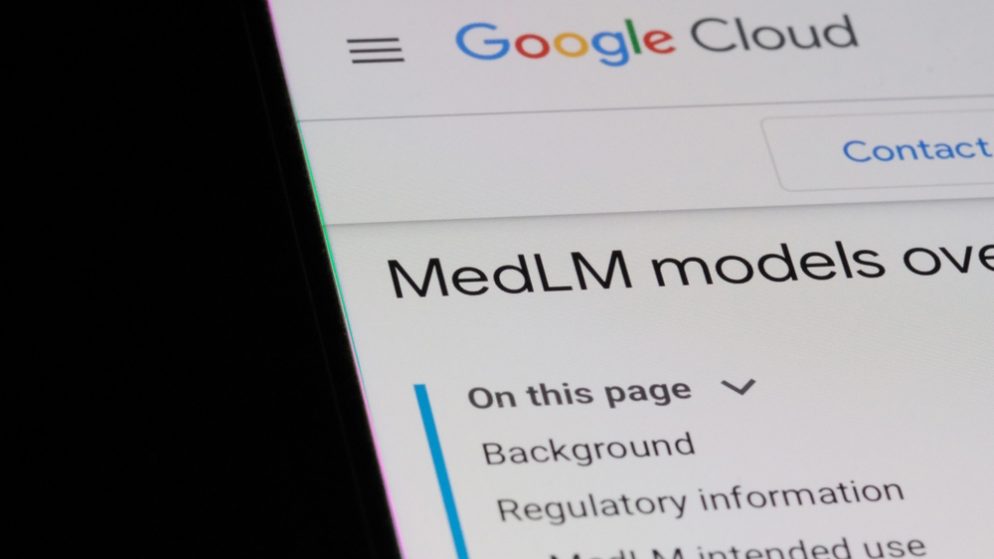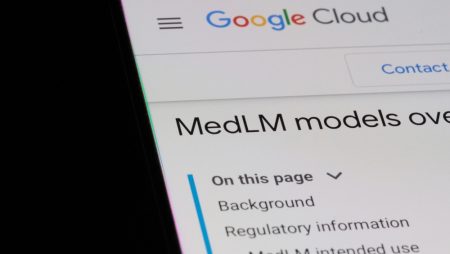



Get new exclusive access to healthcare business reports & breaking news




Google has introduced, in a joint statement by Yossi Matias, the company’s VP Engineering & Research and Aashima Gupta, Global Director, Healthcare Strategy & Solutions at Google Cloud, MedLM — a family of foundation models fine-tuned for healthcare industry use cases.
The company officials stated that Google has made big strides since their initial research into medically-tuned large language models (LLMs) with Med-PaLM in 2022 and 2023, advancing towards improving healthcare and medicine.
“We’ve been testing Med-PaLM 2 with healthcare organizations, and our Google Research team continues to make significant progress, including exploring multimodal capabilities. Now we’re introducing MedLM — a family of foundation models fine-tuned for healthcare industry use cases. MedLM is now available to Google Cloud customers in the United States through an allowlisted general availability in the Vertex AI platform”, the Google officials said. MedLM is also currently available in preview in certain other markets worldwide.
Currently, there are two models under MedLM, built on Med-PaLM 2, to offer flexibility to healthcare organizations and their different needs. Healthcare organizations are exploring the use of AI for a range of applications, from basic tasks to complex workflows. Through piloting their tools with different organizations, Google learned the most effective model for a given task varies depending on the use case. For example, summarizing conversations might be best handled by one model, and searching through medications might be better handled by another. The first MedLM model is larger, designed for complex tasks. The second is a medium model, able to be fine-tuned and best for scaling across tasks. The development of these models has been informed by specific healthcare and life sciences customer needs, such as answering a healthcare provider’s medical questions and drafting summaries. “In the coming months, we’re planning to bring Gemini-based models into the MedLM suite to offer even more capabilities.
Many of the companies we’ve been testing MedLM with are now moving it into production in their solutions, or broadening their testing”, Matias and Gupta wrote.
As Google brings the transformative potential of generative AI to healthcare, its team focuses on enabling professionals with a safe and responsible use of this technology.
The effort to immerse itself into healthcare and bite a bigger chunk of the pie is not a new endeavor for Google. Back in 2019, Google has used $2.1 billion of its parent company Alphabet’s reserves to acquire Fitbit, in order to obtain leverage in competing over Apple in the consumer health market. That was a good move, as time proved it, but other projects did not develop as expected. For instance, Google dismantled its Google Health Division after only three years of activity, and that was not the first time it has happened, since Google’s first attempt to disrupt healthcare—a service, also called Google Health, which administered health records — was shut down in 2012 after four years.
Now, the company is working in close collaboration with practitioners, researchers, health and life science organizations, as well as the individuals at the forefront of healthcare. “We’re excited by the progress we’ve seen in just one year — from building the first LLM to obtain a passing score (>60%) on U.S. medical-licensing-exam-style questions (published in Nature), to advancing it to obtain an expert level score (86.5%), to applying it in real-world scenarios through a measured approach. As we reflect on 2023 — and close out the year by expanding MedLM access to more healthcare organizations — we’re excited for the progress and potential ahead and our continuing work on pushing forward breakthrough research in health and life sciences”, Yossi and Gupta said.
Among the companies who partnered with Google on this endeavor, Augmedix, a healthcare technology company that delivers industry-leading, ambient medical documentation and data solutions, announced the same day it has been piloting Google Cloud’s Med-PaLM 2 and will integrate Google Cloud’s newly introduced MedLM technology into its technology stack. This model suite uses the latest AI developments adapted for healthcare use cases and meets Augmedix’s stringent requirements around AI safety, compliance, and enterprise scalability.
MedLM, now generally available to allowlisted customers, builds on Google Cloud’s Med-PaLM 2 generative AI (gen AI) large language model (LLM). MedLM is purposefully built to provide high-quality generative AI output in the medical domain. It comes with a suite of medically-tuned models for different use cases—delivering the best of Google Cloud’s gen AI capabilities to the healthcare industry. Importantly, Augmedix uses Google Cloud’s Vertex AI platform to develop its own proprietary solutions using training data created by Augmedix’s existing technology that generates 70,000 notes per week and spans more than 30 specialties1.
“Generative AI solutions for use in healthcare delivery require a more tailored and precise approach than general purpose LLMs can provide, which is why we value our strategic partnership with Google Cloud,” said Augmedix Founder, Director, and Chief Strategy Officer Ian Shakil. “Google Cloud has established its leadership as an AI innovator with solutions specifically designed to address the needs of healthcare providers.”
In recent months, Google Cloud has been closely iterating with Augmedix to ensure optimized performance in challenging, real-world medical use cases through ambient documentation, where relevant medical information is recorded and captured from natural clinician-patient interactions at the point of care. Augmedix now plans to incorporate MedLM into its machine learning platform across its suite of products. Integrating MedLM into its ambient medical documentation products will elevate the quality of medical note output, provide faster turnaround times, and enable Augmedix to rapidly expand into more sub-specialties through 2024. This new technology will be integrated into the recently launched Augmedix Go, a clinician-controlled mobile app that instantaneously creates a fully automated draft medical note after each patient visit, and will soon be incorporated into all Augmedix documentation products.
“Generative AI has enormous potential to automate one of the most time-intensive and tedious tasks in healthcare—capturing accurate medical notes of doctor-patient interactions,” said Thomas Kurian, CEO, Google Cloud. “We are committed to advancing solutions that allow organizations like Augmedix and its health system clients to address these and other challenges in the healthcare industry. Our launch of MedLM and partnership with Augmedix exemplifies our commitment to solve these once-intractable problems.”
This integration of MedLM is an exciting milestone for Augmedix customers such as HCA Healthcare, who introduced Augmedix’s documentation products to four hospitals earlier in 2023.
“We’ve introduced Augmedix’s technology into some of our hospitals this year,” said Michael J. Schlosser, MD, MBA, FAANS, Senior Vice President of Care Transformation and Innovation, HCA Healthcare. “I’m pleased to see that our innovative partners at Google Cloud and Augmedix are continuously focused on advancing their products to streamline workflows and allow caregivers to focus on what matters most, patient care.”
The company also collaborated with Accenture to increase enterprise adoption and help healthcare organizations utilize MedLM and Deloitte and healthcare providers to help care teams obtain information from provider directories and benefits documents to help contact center agents identify best-fit providers for members.
Google Cloud’s customers retain control over their data. In healthcare settings, access and use of patient data is protected through the implementation of Google Cloud’s reliable infrastructure and secure data storage that support HIPAA compliance, along with each customer’s security, privacy controls, and processes.